- Home
- Leslie Meier
Trick or Treat Murder Page 2
Trick or Treat Murder Read online
Page 2
It was a long, rectangular room with three sets of French doors along one side. There was a magnificent, ornate marble fireplace at one end and a balcony for musicians at the other. Facing the French doors there was a wall of matching mirrors, now spotty and dusty. The panels between the doors were decorated with carved wood shaped into lavish bouquets of flowers. Gilt sconces, long since robbed of their crystals, lined the walls.
"Sue, how can you say you want to see all this demolished?" asked Lucy. "It's fabulous."
"It could be, if somebody had hundreds of thousands of dollars to spend fixing it up. But that's not going to happen. It's been empty for a zillion years, falling apart bit by bit. A rock through a window here, a piece of paneling ripped out there, it's like the death of a thousand cuts. I'm all for a swift mercy killing."
"You really care about this old place."
"They just don't build 'em like this anymore. Hey, I want to show you something."
Returning to the hallway, Sue opened another oak-paneled door and revealed a tiny cabinlike room, barely ten feet square.
"This is the house Ezekiel Hallett was born in. When he got rich he built the mansion right around his boyhood home. They say he used to come here to get away from his social-climbing wife and daughters."
Lucy examined the rough-sawn plank walls, the packed dirt floor, and the crude hearth.
"This was the entire house?"
"Yup. He was one of seven or eight kids. There's a sleeping loft overhead."
"From this to that," said Lucy, trying to imagine raising a family in such cramped quarters. "It's incredible."
"He did it the hard way—selling guano."
"What is guano, anyway?" asked Lucy, heading for the door. She found the tiny, windowless room claustrophobic. "I'm gonna go out on the porch. I need some air."
"Okay," said Sue. "I'll lock the door behind you and backtrack through the house."
"I forgot. We didn't come in through the front door, did we?"
Lucy stepped outside and busied herself gathering the picnic things. She was struggling to her feet when Sue reappeared.
"You know, Lucy, it might be kind of fun to try out that gym," she suggested.
"I think I'm past help. Besides, I don't have any energy to spare."
"They say working out gives you energy, though I don't quite see how," admitted Sue. "I'll give them a call. See if they've got a good deal."
"Don't forget to ask if they have child care," said Lucy, open¬ing the car door and beginning the process of transferring Zoe from the baby carrier to the car seat
.
"I'll call," said Sue, hopping into her little sports car and start¬ing the engine.
Lucy watched as she zoomed down the dirt driveway, disap¬pearing in a swirl of dust. Finally clicking the last strap in place, she looked down at the baby. "Do you think I'm too fat?" she asked.
Zoe folded her hands across her chest, and closed her eyes. She was as inscrutable as a little Buddha.
"Okay, be like that," said Lucy, settling herself behind the steering wheel and turning the key in the ignition.
CHAPTER TWO
Ted Stillings, editor-in-chief, reporter, photographer, and publisher of The Penny saver, parked his aging subcompact in front of the Hopkins Homestead and climbed out.
"Whew," he said, shaking his head. He'd covered a lot of fires in his career, but never one this bad. There was literally nothing left of the house. The massive chimney, now black with soot and surrounded by a mound of charred rubble, was all that remained.
A yellow plastic ribbon encircled the site, and a few curious onlookers stood politely behind it. Inside the cordon, Fire Chief Stan Pulaski stood chatting with Police Chief Oswald Crowley. Ted lifted the yellow ribbon, ducked under it, and approached them.
"Hey, you! Stay behind that line," ordered Crowley. He knew perfectly well who Ted was, but enjoyed being as obnoxious as possible.
"Cut it out, Crowley," yelled Ted. "I need some information."
"You think writing that paper of yours gives you special privileges or something?" Crowley narrowed his eyes, and picked at his yellow teeth with his fingernail.
"People want to know what happened and I want to tell them," said Ted, turning to face Pulaski. "So, Chief, what's the story?"
"I haven't finished the report yet," he answered affably. "Soon as I do you can pick up a copy at the station."
"Thanks." Ted surveyed the scene. "Mind if I take a few pictures?"
"I guess that'll be all right. Stay clear of the debris, okay?"
"Sure."
Ted walked off a short way and pulled his camera out of the worn bag that hung from his shoulder. He busied himself screwing on a lens and adjusting the exposure while keeping one ear cocked. He wasn't above a little discreet eavesdropping.
"Damn reporters," he heard Crowley mutter.
"Better get used to it," advised Pulaski. "This is gonna be a big story, soon as somebody figures out we've had four fires in four months."
Ted looked through the viewfinder and stepped a little closer to the two chiefs.
"He's late." Crowley consulted his watch. "Girl in his office said he'd be here at nine."
"Here he is," announced Pulaski, nodding as an official blue van pulled into the driveway. Neat white letters on the side and back read FIRE MARSHAL.
Ted whistled softly to himself, pulled out his notebook, and joined the two chiefs in greeting the newcomer.
"Mike Rogers, assistant fire marshal," he said with a grin, ex¬tending his hand. Rogers was a friendly fellow.
"Ted Stillings, Pennysaver Press," said Ted, shouldering his way between Crowley and Pulaski and grasping his hand. "Have you got Sparky with you?" Ted knew all about Sparky, the accelerant-sniffing dog, from the frequent press releases issued by the state fire marshal's office.
"Sure do. He's right here."
Rogers opened the back door of the van and released the dog, a youthful black Labrador, from his portable wire kennel. Sparky gave an enormous yawn, stretched, shook himself, and waited pa¬tiently while his leash was fastened. Then, walking smartly beside his handler, he went to work.
"This dog's been trained to identify more than a hundred dif¬ferent accelerants?" asked Ted, pointedly ignoring Crowley's disapproving glare.
"That's right. He went to a special school in Michigan. I went too. We work as a team."
"Is that right?" asked Ted, scribbling away in his notebook. "Where does Sparky live?"
"He lives with me. He's part of the family. When I go to work, he goes, too."
"Is he a good pet?"
"He's great. My kids love him," said Rogers, pausing at the edge of the debris and scratching the dog's neck. "Okay, the way we do this is we sweep the site in a systematic way, working from the outside in. Don't follow me, Ted. There may be hot spots and I don't want to disturb any evidence."
"So what made you call in the fire marshal, Chief?" Ted threw out the question in a deliberately offhand manner as he peeredthrough the viewfinder. "Is there something suspicious about this fire?"
Crowley and Pulaski exchanged glances.
"It was a very fast, very hot fire. The house was completely engaged in a matter of minutes. That doesn't happen unless there are multiple points of origin." Pulaski took off his peaked cap and wiped his forehead with a large white handkerchief.
"You mean arson?"
"Maybe."
"Crowley, have you got any suspects?" There was a slight challenge in Ted's tone.
"No comment." Crowley's attention was on the dog, who had assumed a classic pointing position. "There?" he called.
"Yup," said Rogers, squatting down and opening a toolbox. As they watched he took a sample of the burned material and care¬fully placed it in a jar.
Sparky indicated the presence of accelerant in three more lo¬cations along what had been the outside wall of the house. Once he began investigating the inside, however, he didn't seem to find anything. The man and the d
og worked slowly, stepping gingerly among the blackened boards and other charred remains. Ted had plenty of time to get some dramatic photos of Sparky in action.
Rogers spoke softly to the dog, encouraging him and keeping his mind on his task. They had reached the far side of the house, behind the chimney, when the dog began whining and scratching frantically at the rubble.
"What's he found?" shouted Pulaski, hurrying over. "More accelerant?"
"No." Rogers shook his head. "I'm afraid you've got some human remains here."
"A body" Crowley was doubtful. "This is just a summer place. Nobody's here after Labor Day."
"He only does this when he finds a body," said Rogers. He glanced at the dog who was standing rigid and shivering.
"There is no body here," insisted Crowley. "I don't see a body. There's nothing but ashes."
"It was a hot fire," Rogers reminded him. "There's probably teeth, bone fragments, maybe even jewelry. I'll have to call in specialists from the medical examiner's office. Meanwhile, let's get this area secured and covered with a tarp."
"Winchell," Crowley yelled to a young officer who was standing nearby. "Find Carter. Get on this right away."
"Okay, Chief," he said, setting off across the yard at a trot.
"I think we're about done here," said Rogers, gently tugging at Sparky's leash and leading the trembling dog back to the van. "Good boy." He stroked the animal behind his ears. Sparky gave him a look of doggy adoration and licked his hand.
"What happens now?" Ted asked the chief. But before Crowley could tell Ted to mind his own business he was interrupted by Winchell.
"Chief, Carter's found a car behind that shed. A BMW."
"Damn," said the chief. The last thing he wanted was a homicide.
"You, Stillings." He stabbed a fiat finger at Ted's chest. "I want you out of here." He cocked his thumb. "Now."
"Okay, okay," said Ted, holding his hands up. "I know when I'm not wanted."
He started off toward his car, and Pulaski joined him, walking companionably alongside. Unlike the police chief, Pulaski understood the value of a good working relationship with the local media.
"Check at the station, Ted. We'll be scheduling a press conference this afternoon, tomorrow morning at the latest."
"Thanks."
"No problem." He paused. "I have something to say." Ted got out his pad, and when he was ready, Pulaski continued. "I hate arson. Every time my men go out to fight a fire, they put themselves at risk. Every time. And now we've got a death. Somebody died in this fire.
"This is my pledge to the people of Tinker's Cove: I'm going to catch this bastard. But I need help. Anybody sees any suspicious activity, especially around a vacant building, call us. Call right away. Arson's hard to prove, unless the perpetrator is caught in the act. Got that?"
"Got it."
Humming softly to himself, Ted got behind the wheel of his car. He was already rearranging the front page in his mind. Scratch the photo of the jack-o'-lantern, put the "Healthy Holiday Treats" interview with the school dietitian on page five, move "Officer Culpepper's Rules for a Safe Halloween" to page six. Arson, homi¬cide, this was going to be one hell of a Halloween issue.
CHAPTER THREE
There was an annoying buzz in the room. If she didn't stop it, it would wake up the baby.
Lucy sat up in bed. She opened her eyes. Zoe was sleeping peacefully in her white wicker bassinet. She couldn't find the hum.
"Lucy, turn off the alarm."
"Unh." She reached out and pressed the button. She flopped back on her pillow and felt herself slipping back in the warm cocoon of sleep. So easy to drift off, except for the tug of her conscience. She had to get the kids ready for school, and Bill off to work. She threw off the covers and sat up, groping for slippers and robe. Standing, she staggered slightly and caught her balance on the door frame.
She crossed the hall to her eleven-year-old son's room. Picking her way carefully across the dirty clothes and sports equipment that littered the floor, she gave his shoulder a shake. "Toby, it's time to get up."
Next she stuck her head in Sara and Elizabeth's room. "Good morning, girls," she called. Elizabeth was nine, going on twenty- nine, and Sara was five.
She went down the steep back stairs to the kitchen, made the coffee, and continued on into the downstairs bathroom. She splashed cold water on her face and looked in the mirror. Short black hair stuck out all over her head and there were bags under her eyes. She looked terrible. What did she expect? She'd been up most of the night with the baby. She brushed her teeth.
Back in the kitchen, she poured herself a cup of coffee and sat down at the table, resting her head on her hands.
"Mom, I need you to sign this." Toby's voice pulled her back to consciousness.
"What is it?"
"A pledge that you won't abuse your body by taking any illegal drugs."
"No problem," she mumbled, scribbling her name. "Got any speed, man?"
"What?"
"Nothing." She took a long swallow of coffee.
When she next opened her eyes, she saw Bill standing at the counter, dressed for work in a plaid flannel shirt and jeans, buttering a pile of toast.
"Sara, that pink scrunchy is mine," said Elizabeth.
"No, it isn't." Sara's voice started to climb the scale. "It's mine!"
"Let her wear it," said Lucy.
"That's so unfair. You're always siding with her." Elizabeth stamped across the kitchen and plunked herself down on a chair.
"What's the matter with your eye?" asked Bill, setting a glass of orange juice in front of her.
Lucy squinted suspiciously at Elizabeth. She reached out and ran a finger across her eyelid.
"Eye shadow! Wash it off."
Elizabeth glared at her, then stomped off to the bathroom.
"More coffee" Bill had the pot ready.
"Please. Intravenously."
"Mom, can you come to school tomorrow?" asked Sara. "Officer Barney is visiting our class." Sara was in kindergarten, and she loved it. After watching Toby and Elizabeth go off to school every day, she was finally in school, too.
"Sure," said Lucy. She looked up as Elizabeth returned. "That looks much better."
"All the other girls wear makeup."
"Right." Lucy heard the roar of the school bus engine, as it began the climb up Red Top Road. "You better get going. The bus will be here any minute."
The kids pushed and shoved, grabbing their backpacks and lunches, then clattered out, slamming the door behind them. Lucy picked herself up and started up the stairs, heading back to bed.
"What the hell?" Bill was peering out the kitchen window, thoughtfully stroking his beard.
Lucy joined him. "Oh, my God," she groaned, spotting a huge old Chrysler Imperial turning into the driveway, narrowly missing a whiskey barrel planted with bronze chrysanthemums. "It's Miss Tilley. What could she want so early in the morning?"
"The old witch probably hasn't been to bed yet," said Bill. "Probably been riding her broomstick all night."
Stifling a yawn, Lucy opened the door. "Miss Tilley, what a nice surprise!"
Like most everyone in Tinker's Cove, Lucy didn't dare address the old woman by her first name. Only a select group of her dearest friends referred to Julia Ward Howe Tilley, the former librarian of the Broadbrooks Free Library, as Julia.
Casting a disapproving glance at Lucy, who found herself involuntarily buttoning up her ratty old velour robe, the old woman wasted no time getting to the point. "Bill, it was really you I came to see," she said, baring her complete set of rather dingy original teeth in a ferocious smile.
"Me?"
"Sit down. I have something I want to discuss. You, too, Lucy."
Meekly, they obeyed, waiting while the old woman settled herself.
"As you know," she began, folding her knobby, arthritic hands together on the edge of the table, "I am a member of the Tinker's Cove Historic District Commission. The chairman, in fact. Unfor
tunately, we have a vacancy now that Porter Lambkin has resigned. He has cancer and says his treatment will prevent him from attending meetings." From Miss Tilley's expression, it was clear she disapproved. In her eyes, sickness was usually nothing more than a convenient excuse for neglecting one's duty.
"I wouldn't have expected it of him," she fumed. "He's left us in a terrible predicament."

 Christmas Card Murder
Christmas Card Murder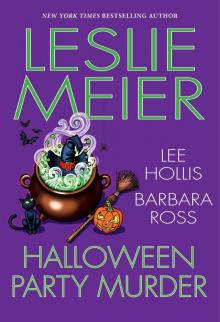 Halloween Party Murder
Halloween Party Murder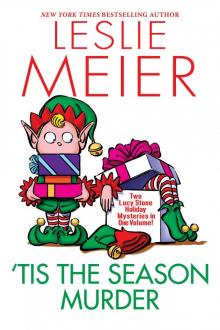 'Tis the Season Murder
'Tis the Season Murder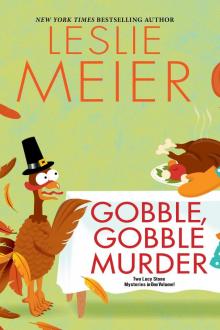 Gobble, Gobble Murder
Gobble, Gobble Murder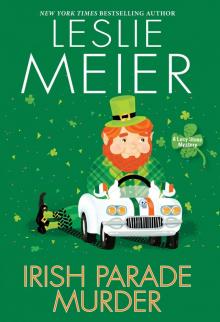 Irish Parade Murder
Irish Parade Murder Bake Sale Murder
Bake Sale Murder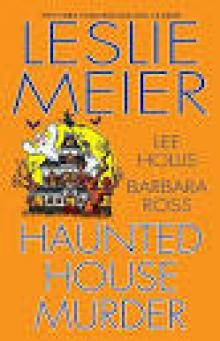 Haunted House Murder
Haunted House Murder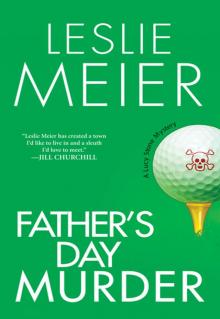 Father’s Day Murder
Father’s Day Murder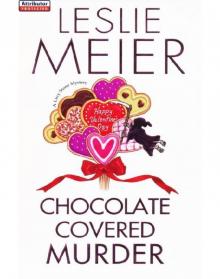 Chocolate Covered Murder
Chocolate Covered Murder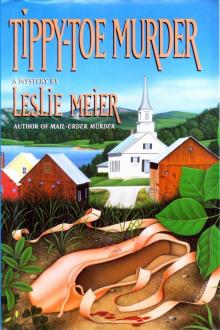 Tippy Toe Murder
Tippy Toe Murder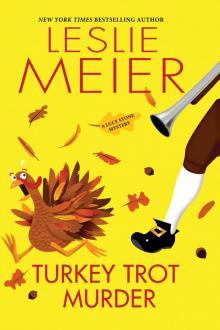 Turkey Trot Murder
Turkey Trot Murder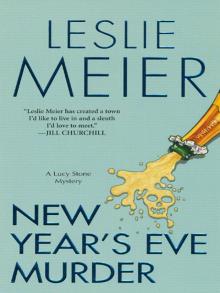 New Year's Eve Murder
New Year's Eve Murder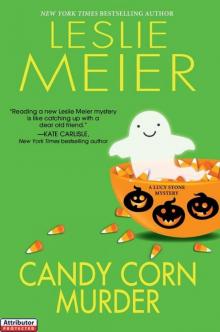 Candy Corn Murder
Candy Corn Murder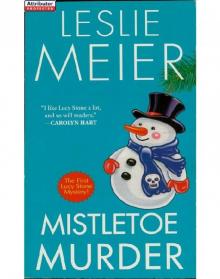 Mistletoe Murder
Mistletoe Murder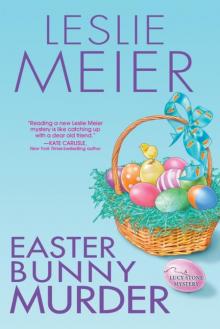 LStone 20 - Easter Bunny Murder
LStone 20 - Easter Bunny Murder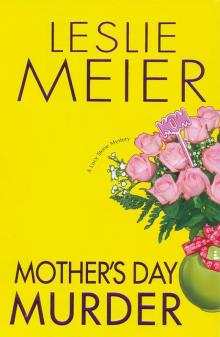 Mother's Day Murder
Mother's Day Murder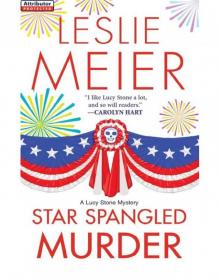 Star Spangled Murder
Star Spangled Murder Silver Anniversary Murder
Silver Anniversary Murder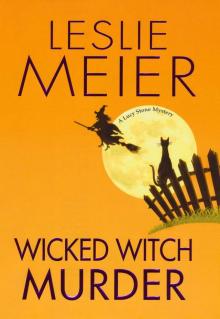 Wicked Witch Murder
Wicked Witch Murder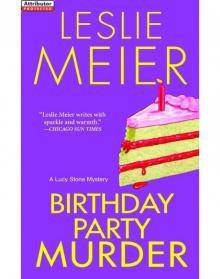 Birthday Party Murder
Birthday Party Murder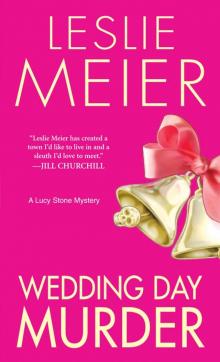 Wedding Day Murder
Wedding Day Murder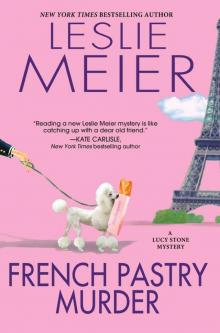 French Pastry Murder
French Pastry Murder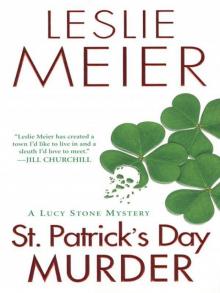 St. Patrick's Day Murder
St. Patrick's Day Murder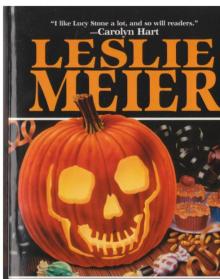 Trick or Treat Murder
Trick or Treat Murder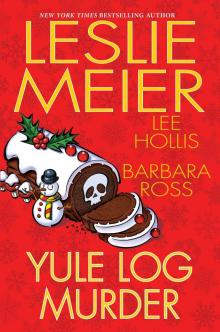 Yule Log Murder
Yule Log Murder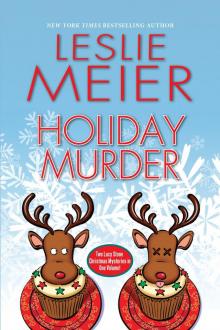 Holiday Murder
Holiday Murder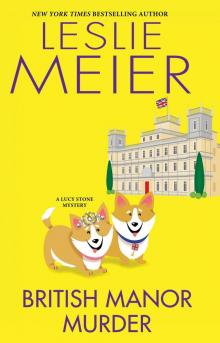 British Manor Murder
British Manor Murder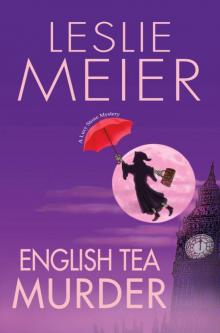 English Tea Murder
English Tea Murder